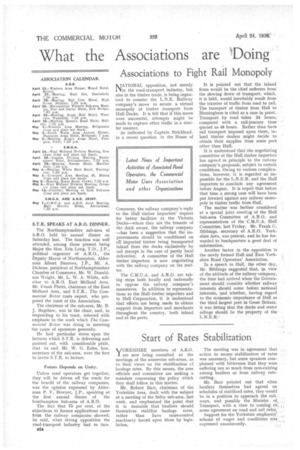What the Associations are 'Doing
Page 38

If you've noticed an error in this article please click here to report it so we can fix it.
Associations to Fight Rail Monopoly
S.T.R. SPEAKS AT A.R.O. DINNER.
The Northamptonshire sub-area of A.R.O. held its annual dinner on Saturday last. The function was well attended, among those present being Major the Hon. Eric Long, T.D., J.P., political organizer of A.R.O., the Deputy Mayor of Northampton, Alderman Albert Burrows, J.P., Mr. A, Dickens, president of Northamptonshire Chamber of Commerce, Mr. W. Donaldson Wright, Mr. L. W. A. White, solicitor to A.R.O. East Midland Area, Mr. Frank Platts, chairman of the East Midland Area, and S.T.R., The Commercial Motor costs expert, who proposed the toast of the Association.
The chairman of the sub-area, Mr. B. J. Bagshaw, was in the chair, and, in responding to his toast, referred with emphasis to the work which The Commercial Motor was doing in assisting the cause of operators generally.
He laid particular stress upon the lectures which S.T.R. is delivering and pointed out, with considerable pride, that he and Mr. W. G. Eales, hon. secretary of the sub-area, were the first to invite S.T.R. to lecture, Future Depends on Unity.
Unless road operators get together, they will be driven off the roads for the benefit of the railway companies, was the opinion expressed by Alderman P. V. Bowyer, J.P., speaking at the first annual dinner of the Southampton Sub-area of A.R.O.
The fact that 75 per cent, of the objections to licence applications came from the railway companies showed, he said, what strong opposition the road-transport industry had to face.
B24 MATIONAL opposition, not merely J. in the road-transport industry, but also in the timber trade, is being organized to counter the L.N.E. Railway company's move to secure a virtual monopoly of timber transport from Hull Docks. It is felt that if this move were successful, attempts might be made to capture other traffic in a similar manner.
As indicated by Captain Strickland, in a recent question in the House of Commons, the railway company's reply to the Hull timber importers' request for better facilities at the Victoria Docks—whcre they are the tenants of the dock owner, the railway company —has been a suggestion that the improvements should be conditional on all imported timber being transported inland from the docks exclusively by rail (except in the case of purely ,local deliveries). A committee of the Hull timber importers is now negotiating with the railway company on the matter.
The C.M.U.A. and A.R.O. are taking steps both locally and nationally to oppose the railway company's manceuvre. In addition to representations to the Hull-timber importers and to Hull Corporation, it is understood that efforts are being made to obtain support from importers and merchants throughout the country, both inland and at the ports. It is pointed out that the inland firms would be the chief sufferers from the slowing down of transport, which, it is held, would inevitably result from the transfer of traffic from road to rail. The transport of timber from Hull to Birmingham is cited as a case in point. Transport by road takes 24 hours, compared with a rail-journey time quoted as 48 hours. Rather than have rail transport imposed upon them, inland timber dealers might decide to obtain their supplies from some port other than Hull.
It is understood that the negotiating committee of the Hull timber importers has agreed in principle to the railway company's proposals, subject to certain conditions. Owing to various complications, however, it is regarded as impossible for the L.N.E.R. and the Hull importers to conclude any agreement before August. It is hoped that before that time a strong case will have been put forward against any railway monopoly in timber traffic from Hull.
The matter was further considered at a special joint meetilig of the Hull Sub-area Committee of A.R.O. and representatives of the C.M.U.A. Hull Committee, last Friday. Mr. Frank G. Bibbings, secretary of A.R.O. Yorkshire Area, was present, and he has forwarded to headquarters a good deal of information.
Another factor in the opposition is the newly formed Hull and East Yorkshire Road Operators' Association.
In a speech in Hull, the other day, Mr. Bibbings suggested that, in view of the attitude of the railway company,' the time had arrived when the Government should consider whether railway interests should come before national interests, and whether, having regard to the economic importance of Hull as the third largest port in Great Britain, it was fitting that the docks and water sidings should be the property of the




























































































